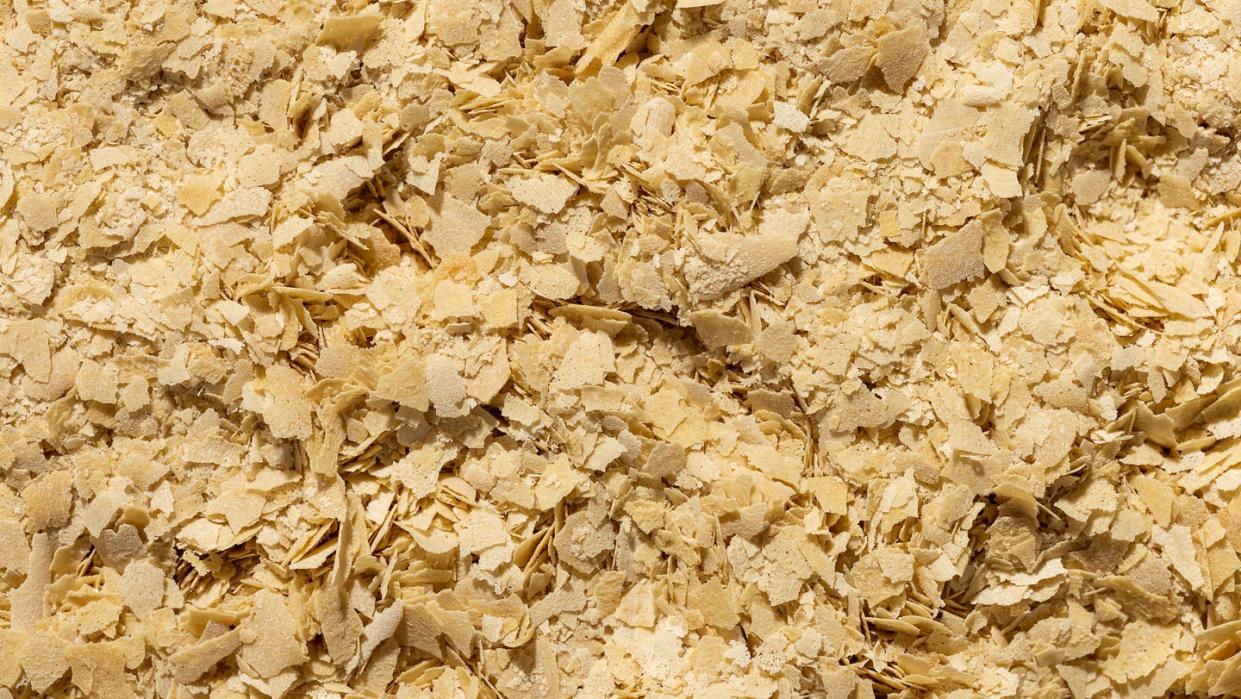4 Surprising Health Benefits of Adding Nutritional Yeast to Your Diet

"Hearst Magazines and Yahoo may earn commission or revenue on some items through these links."
Nutritional yeast is a seasoning—yellow in color and available as flakes, granules, or a powder—that can be used in various dishes. This product can fit into any diet and is naturally low in sodium, fat-free, sugar-free, and gluten-free. But what nutritional yeast benefits can you reap from adding a sprinkle to your meal?
Meet the Experts: Keri Gans, M.S., R.D., author of The Small Change Diet; Jackie Newgent, R.D.N., C.D.N., chef, nutritionist, and author of The Plant-Based Diabetes Cookbook; Courtney Pelitera, M.S., R.D., C.N.S.C., registered dietitian and owner of Devour Your Life; Melissa Prest, D.C.N., R.D.N., national media spokesperson for the Academy of Nutrition and Dietetics and member of the Prevention Medical Review Board.
While adding a sprinkle of yeast may not sound appetizing outright, there are many reasons to keep an open mind about the superfood and all it can do for your health. Ahead, our nutrition experts explain what nutritional yeast is, how it can add a boost of vitamins and minerals to your meals, and how to use it in your daily dishes.
What is nutritional yeast?
Nutritional yeast is a deactivated version of the same yeast used to make bread rise, says Courtney Pelitera, M.S., R.D., C.N.S.C., registered dietitian and owner of Devour Your Life. “The yeast is part of a family of fungi similar to mushrooms and is allowed to live and grow for only a few days before becoming inactivated through a heating and drying process.” The end result is best described as a flaky powder that is high in nutrients, Pelitera explains.
Fortified nutritional yeast is often used in vegan and vegetarian diets because it can provide vitamins and minerals that may be missing from their diets, says Melissa Prest, D.C.N., R.D.N., national media spokesperson for the Academy of Nutrition and Dietetics and member of the Prevention Medical Review Board. It also does not contain common allergens like soy and gluten, she adds, making it celiac-friendly.
If you’re wondering what flavor this superfood may add to your meal, nutritional yeast actually provides a savory cheesy-like taste and is often used as a vegan seasoning or swap for parmesan cheese, says Jackie Newgent, R.D.N., C.D.N., chef, nutritionist, and author of The Plant-Based Diabetes Cookbook.
Benefits & nutrition facts
Good source of vitamin B
Nutritional yeast is best known as a great vegan source of the B vitamins (B6, B12, thiamine, folate, niacin, riboflavin), says Pelitera. “In fact, it is one of the very few vegan sources of B12,” she notes. Vitamin B12 is a nutrient that helps keep your body's blood and nerve cells healthy and helps make DNA, the genetic material in all of your cells.
Protein boost
Nutritional yeast includes 9 essential amino acids, making it a complete protein, says Prest. It’s also high in its protein content with about 7-9 g per 1 tbsp serving, says Pelitera. “That is just as much as a ¼ cup serving of beans!” This is a great product for vegans and vegetarians looking for an easy-to-add plant-based protein source, Pelitera points out.
Rich in fiber
Nutritional yeast contains beta-glucans, a type of fiber that may aid in lowering cholesterol, Prest explains. Studies have also shown that beta-glucans can strengthen your immune system, support bone density, as well as lower blood pressure. Because nutritional yeast is rich in fiber, it may also promote gut health as well as aid satiety, notes Keri Gans, M.S., R.D., author of The Small Change Diet.
Antioxidant properties
Nutritional yeast is also rich in zinc, says Gans. “Zinc is a powerful antioxidant with anti-inflammatory properties that may help decrease the risk of heart disease and certain cancers, and support immune health,” she explains.
Nutritional yeast nutrition facts
The product is going to differ slightly dependent on the manufacturer, but an average 2 tablespoon serving of fortified nutritional yeast contains:
50 calories
5 g of protein
3 g of carbohydrates
2 g of fiber
0 g of fat
214 mg of potassium
Potential risks
Experts say you should avoid consuming nutritional yeast if you have:
Yeast allergy: If someone has yeast intolerance, sensitivity or allergy, it would be advisable to avoid nutritional yeast, says Newgent.
Trouble digesting B vitamins: People who have a genetic disorder that impairs their ability to metabolize some B vitamins should avoid the fortified version and choose the unfortified version, says Prest.
Migraines: Yeast contains tyramine which may affect some people prone to migraines, says Prest.
Digestive disorders: If you have a digestive disorder like inflammatory bowel disease or Crohn’s disease, nutritional yeast may worsen your symptoms, says Pelitera.
Tyramine may also interfere with some medications and people taking monoamine oxidase inhibitors, some pain medications, antifungal drugs, and some medications to treat diabetes should not consume nutritional yeast, Prest notes.
How to use nutritional yeast in your meals
Nutritional yeast is a versatile ingredient and is used in almost anything from soups to salads to snacks, says Prest.
To kick up taste in a savory plant-based food, first consider lightly sprinkling it up instead of mindlessly reaching for the salt shaker, says Newgent. Here are some ways she suggests implementing nutritional yeast into your daily meals:
For the flavorful munchie snack with benefits, toss freshly popped popcorn with a mixture of nutritional yeast, fresh grated lemon zest, salt, and pepper.
To add liveliness to simple veggies, squirt with a little lemon or lime juice then sprinkle on some nooch at the table.
Scramble it with chickpeas or tofu to make a plant-based egg dish.
Use it like you might parmesan cheese by whirling it in a plant-based pesto recipe or sprinkling it on top of leafy salads or pasta bowls.
You Might Also Like
